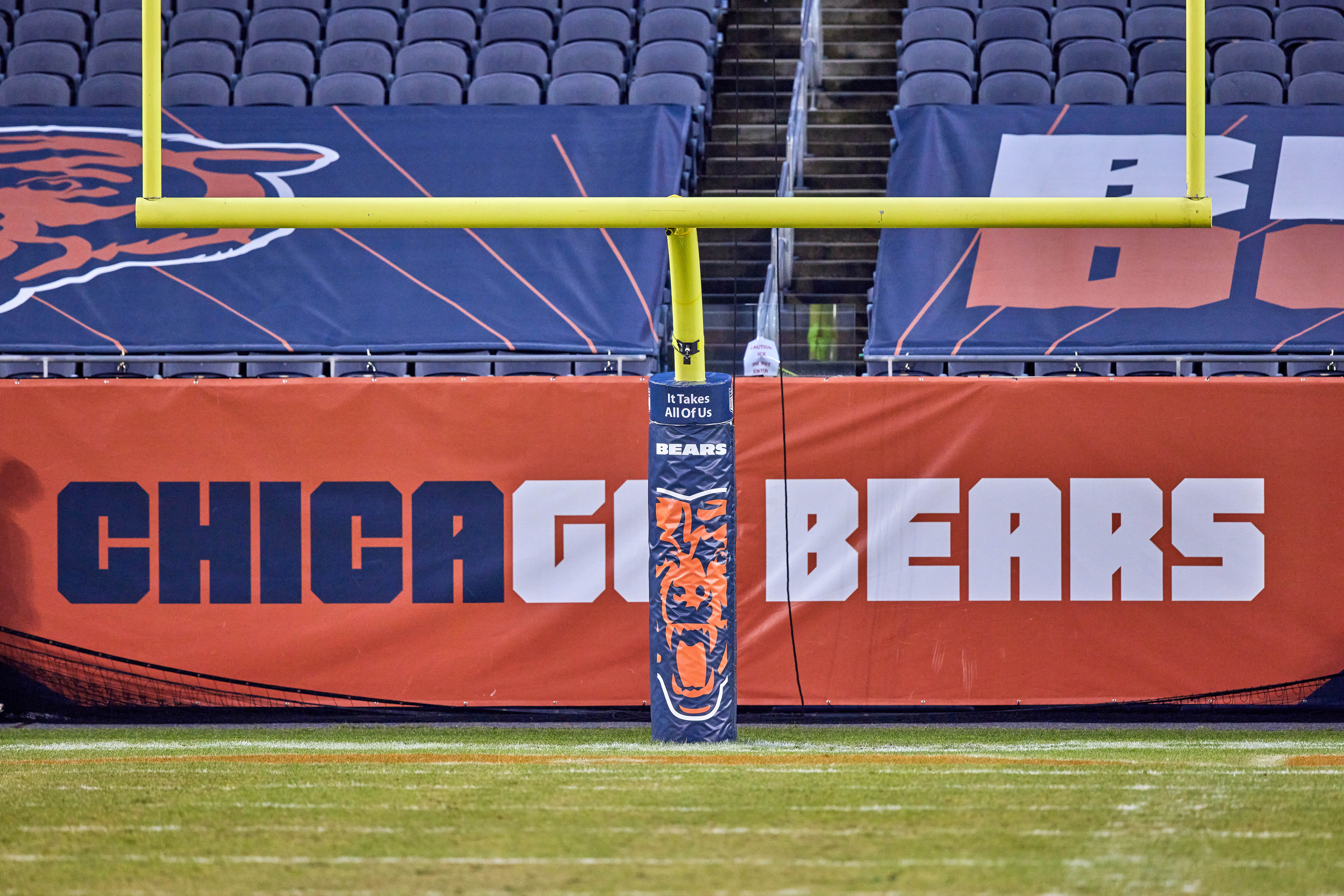Things are heating up with the White Sox's and Bears' stadium desires.
Between the city of Chicago pushing for a unified front with the White Sox and state officials requesting both teams create a joint public funding pitch, there's a lot to catch up on and plenty of unanswered questions.
Here's everything we're asking, and everything we know about the White Sox and Bears stadium dilemma.
Stay in the game with the latest updates on your beloved Chicago sports teams! Sign up here for our All Access Daily newsletter.
What is the White Sox's plan for their stadium? The Bears'?
Let's catch up to speed, first.
The White Sox are reportedly interested in constructing a new stadium at "The 78," an open piece of land in Chicago's South Loop neighborhood that essentially connects Chinatown to the city.
To do that, they'll need financial assistance. Currently, the Illinois Sports Facilities Authority (ISFA) owes over $50 million in bonds issued to Guaranteed Rate Field.
Bears News
But a plan crafted by the organization --- that owner Jerry Reinsdorf brought to the state on Feb. 20 --- focuses on a collection of hotel taxes, sales taxes from the hypothetical stadium and private investments to help issue new bonds and create new lines of revenue for said bonds and the stadium.
The plan is in its early stages and has yet to receive approval from Illinois Gov. J.B. Pritzker. But the White Sox have made clear with their actions they are hoping to gain public funding for the project.
As for the Bears' stadium journey, it began well before the White Sox's.
They purchased land in February 2023 in Arlington Heights for close to $200 million in hopes of building a new stadium. Since then, they've stumbled upon property valuation issues that have motivated them to seek a new location for their stadium.
In short, the school districts of Arlington Heights are rigid on their property valuation, which hands the Bears a larger annual tax bill than they're willing to pay. Both sides are still $100 million apart.
The Bears are now reportedly honing in on the lakefront and Soldier Field's South Lot for a new stadium location.
When do their respective leases end?
The White Sox's lease with Guaranteed Rate is scheduled through 2028.
The Bears' lease with Soldier Field ends in 2033, but they have a buyout option in 2026.
Why is the city of Chicago backing the White Sox?
Newly obtained internal emails show that Mayor Brandon Johnson’s office pushed to publicly present a united front with the Sox after meeting with Reinsdorf in early January.
Both sides released a joint statement about the partnership.
"Mayor Brandon Johnson and White Sox chairman Jerry Reinsdorf met to discuss the historic partnership between the team and Chicago and the team’s ideas for remaining competitive in Chicago in perpetuity. The partnership between the City and the team goes back more than a century and the Johnson administration is committed to continuing this dialogue moving forward."
No one can say for sure why Johnson and the city of Chicago desire to back the White Sox.
However, part of the team's financing plan for their new stadium involves getting the city/state off the hook for the millions they owe on the bonds issued by the ISFA on the previous stadiums.
Why is the state requesting the Bears and White Sox present a joint plan?
The state is telling both teams to present a joint public funding plan for their respective stadiums, as Crain's Chicago Business first reported.
State Senate President Don Harmon specifically has told both teams there is little appetite in the General Assembly to approve separate stadium legislation, according to Crain's.
The request for both teams to work in solidarity on a financial plan makes sense for the state to avoid, as Harmon told Crain's "referee[ing] fights between billion-dollar sports franchises." That way, the state can maintain positive relationships with both teams.
"I think it will make sense for them to work together because there is the danger that they 'won't get picked' if they try to go in alone. Admittedly, that risk is lower for the Bears, but it is still there," Economist/Davidson College professor Fred Smith said in a text conversation with NBC Sports Chicago.
Why is the risk lower for the Bears? Let's keep going.
What is the Bears' threat to the White Sox?
According to Crain's, the teams have had initial conversations about a joint plan, but one isn't expected at this time.
However, a source close to the Bears confirmed to NBC Chicago the team has “always been willing to work with any Chicago team." Reinsdorf also told Crain's that he doesn’t “want to be in competition with the McCaskeys," either.
But after seeing the White Sox make a move to Springfield in hopes of gaining public funding for their stadium, expect the Bears to make a similar move. Remember, in terms of Arlington Heights, the Bears have stated they wouldn't need public funding for the stadium but would require taxpayer money for infrastructure i.e. roads and sewers.
If the White Sox and Bears were to engage in a fight for the state's support of their respective stadium, the Bears would have a clear advantage, experts say.
The name of the game in stadium economics is outside dollars, Smith said. The ability to draw dollars from outside the city and state is how the local economy would benefit from a stadium project.
The Bears have stated they plan to build a stadium with a roof for year-round usage. Assuming they also plan to build a stadium with a larger capacity than Soldier Field's paltry 61,500-seat capacity, they'll have a stadium much larger than the White Sox's.
That means they'll have the bandwidth to host NCAA tournament games, Super Bowls, WWE events, concerts, etc. Those events generate useful dollars for the city/state, as opposed to a White Sox stadium relying on the city's dollars to back the cost of their stadium and outstanding bonds.
“If you look at the proposal from the White Sox, it looks like a gorgeous ballpark and there’s retail and commercial development around it, maybe some hotels," Smith told NBC Sports Chicago. "That’s definitely going to increase the economic vibrancy around that neighborhood.
"But at the end of the day, all that’s doing is changing where people are spending their dollars. If people are spending their dollars in that neighborhood, then maybe they’re not spending their dollars in Logan Square, or maybe they’re not spending their dollars in Wrigleyville."
The White Sox have benefits they can point to over the Bears, too, to be fair.
“What works in the White Sox's favor is you do get some fans coming in from the metro to baseball games," Smith said. "The fact that you have 81 home games. The frequency of the home games does help there. But you’re obviously not hosting a Final Four in a ballpark.”
If the Bears and White Sox entered into a dogfight over the state's support, it's likely the state would opt for the team worth twice the amount of the other, and the one with a significantly better chance to yield positive economic results from their respective stadium plan.
That leads us to the next point.
What could happen if the state refutes the teams' plans for public funding?
Rarely do stadium projects reap true benefits for the cities and states that use public funding to build them. They can, but again, outside dollars are key.
Pritzker understands that and shared his reluctance to offer up public dollars to build stadiums.
"Stadium projects around the country have occurred with public dollars, fewer and fewer over the years and there's a reason for that," Pritzker said Wednesday. "That the return on investment for taxpayers has to be proven now before we would actually move forward. I have not seen proof that this is a good deal for the taxpayers of the state of Illinois, but they have not presented that case yet.
"Lots of great pictures and things that I think are exciting, and I would love to see new stadiums, I’m just not sure that the taxpayers are going to get what they deserve out of that investment with their dollars."
For the Bears, they already own land in Arlington Heights. If they're denied access to public funds in Chicago, they can shift their focus back to Arlington Heights. There, they might have to eat the cost of annual tax bills on the property, but they might be able to garner support from the town's taxpayers for the little amount they claim they would need.
The White Sox, however, are a different story. On Feb. 20, during their trip to Springfield, they reportedly planned to request $1 billion in public funding. A request that big makes it seem impossible to execute without it.
In their scenario, the state might have to weigh the cost of losing future tax dollars to support the White Sox's stadium plans versus the risk of losing the team entirely.
There haven't been any threats from the White Sox about leaving, but the team confirmed Reinsdorf met with Nashville Mayor Freddie O'Connell. The subject of discussion wasn't disclosed, but Crain's reported that the White Sox would consider moving out of Guaranteed Rate Field after the conclusion of their lease.
“I think what it comes down to is the extent to which there’s any concern at the state level that you’re going to lose the White Sox," Smith said. "When this played out in the past, and they were down to the 11th hour in potentially moving to St. Petersburg, I think there is a concern at the city level, but I think there would also be a concern at the state level that you don’t want to lose a professional sports franchise.
"With that said, it’s a cost-benefit thing. Is it worth keeping a second baseball team and foregoing that tax revenue? I can guarantee you the way that the White Sox --- and proponents of the plan --- will spin it is they will basically say ‘Look, that development’s not gonna take place if we don’t do this, so there’s no real cost to the state.’ An economist would push back on that and say ultimately developers are going to do their developments; they may just not do it in that particular location. From the state’s standpoint, I think what it really comes down to is how big of a fear they have of losing the White Sox and how big of a cost they feel that is.”


